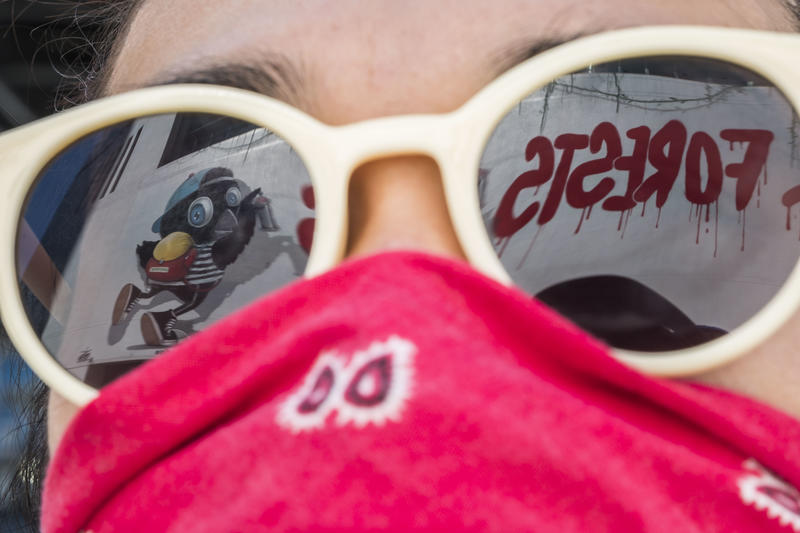Bangkok street artist Muebon has splashed “Save Our Forests” in huge, blood red lettering across the front of the Bangkok Arts and Cultural Centre (BACC).
The artist, whose skull with mouse ears logo will be familiar to street art aficionados the world over, has added his name to global calls to halt the destruction of Indonesia’s rainforests. The 36-year-old artist, known publicly only as Muebon, sat down with Coconuts at a popular coffee shop in busy Siam to reveal more about himself, his art, and why Bangkokians should take note of this environmental issue.
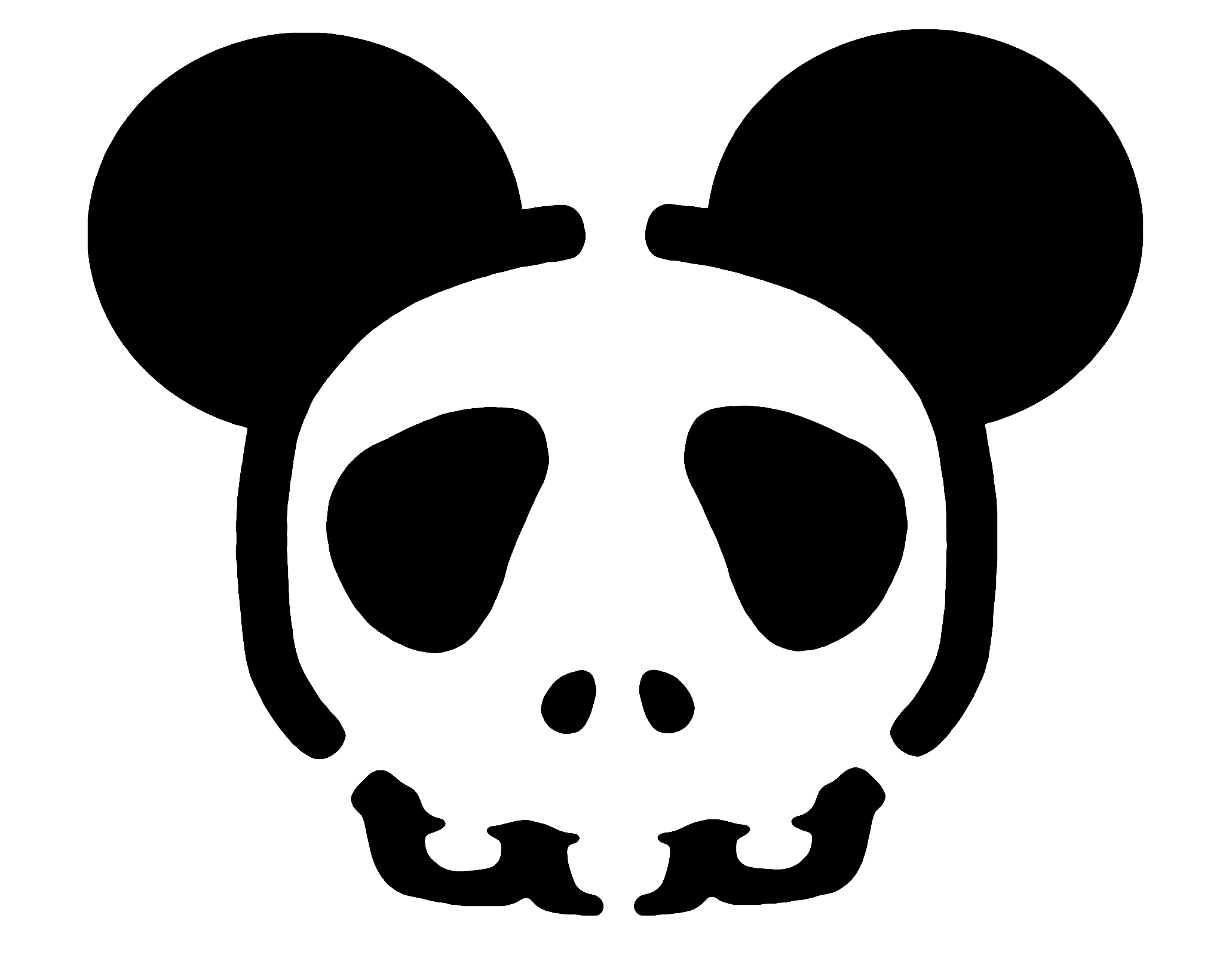
Muebon, appearing youthful in a Simpsons T-shirt and shorts with dark glasses and long hair in a bun, immediately asked for a change of venue. He explained that he could become rather noisy in interview and would prefer a quieter place where there were fewer heads to turn.
As we relocated, we passed his enormous new work. “I painted it in two exhausting night-shifts, ten hours long each. It’s better to paint at night, when no one is about. I want my art to appear as a surprise to people in the morning,” Muebon said. We settled into an empty café and began to talk.
Is there a meaning behind his name? “Yes!” Muebon replied enthusiastically. “The ‘mue’ means ‘hands’ in Thai, while ‘bon’ refers to ‘restlessness’ or ‘fidgeting.’ The name’s also international because ‘bon’ in French means good. So, I have either good or fidgety hands,” he laughed.
There is also meaning behind the memorable skull with mouse ears logo. During his time as a novice monk, Muebon thought a lot about how we will all, inevitably, face death. This explains the skull, but there’s more: “If you imagine you have only a second left to live, life’s problems become unimportant. Feelings of anger evaporate, frustrations cease and you become free of negative emotion. You find peace,” he mused.
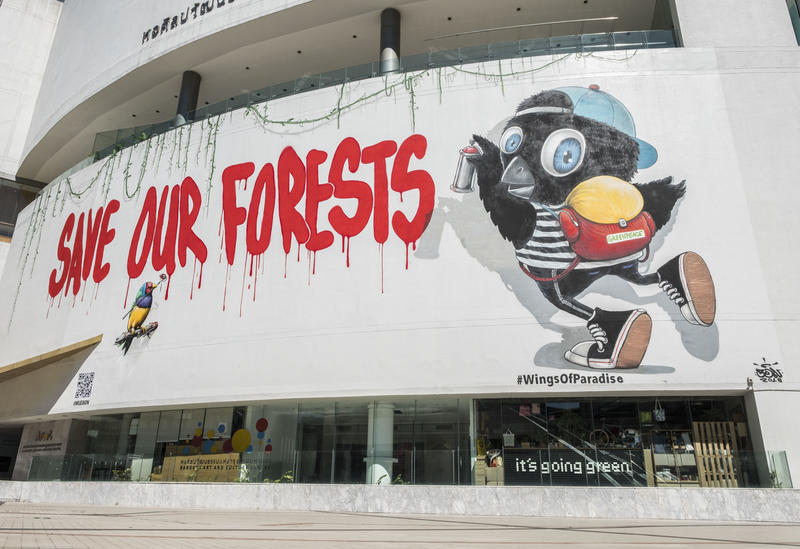
Muebon lay one of his mouse skull stickers on the table. Tracing his pencil from the opening between the ears down to each side of the skull’s mouth a familiar inverted letter ‘Y’ appeared. He had drawn a peace sign. “If you look at death long enough you will find peace,” said the artist.
And the ears? “They represent capitalism and a powerful US media outlet, but also add fun to an otherwise serious image,” Muebon said. He was keen to explain every aspect of his logo’s message, but slightly less detailed when talking about his personal background.
The artist grew up in the slum areas of Thonburi, west of the river, where life was not easy. “There, you can either be bullied or be the bully,” he recalled. After experiencing life as a victim, he opted for a ‘tough guy’ approach. But at the same time, Muebon read avidly and was obsessed with Japanese manga.
Muebon began his street art career as a teenager — decorating the harsh, urban environment around him. Working at night, he often had to escape the police. Against the odds, he made it to university, graduating as a fine artist with honors from Rajamangala Institute of Technology in 2005.
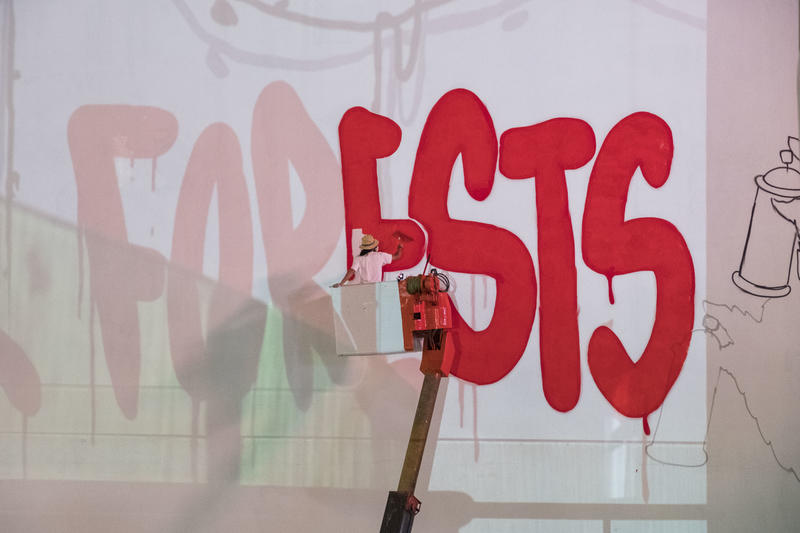
Since then, Muebon has exhibited up and down the country and across Southeast Asia, Australia, Japan, further afield in California, and most recently, Moscow. He produces sculptures and paintings for gallery exhibitions and wins awards, although his passion remains painting on the streets.
Muebon explained why: “I want my art to reach people who don’t go to hi-so galleries. People are busy working, studying, shopping, trying to survive. They don’t have time for art. So, I want to take the art to the people and bring them messages they might not usually receive. That’s why I am a street artist.”
Like other publications, Coconuts agreed not to publish photos of Muebon’s face at the artist’s request. Why does he need to hide? The illegal, underground nature of street art makes remaining anonymous sensible since some may view spray painting walls as mindless graffiti or simply vandalism.
“But it’s more than that,” Muebon enthused: “I want people to focus on my art and its message, not on me or my life. I want people to be interested in the work itself and its message about society, not because I may or may not be a cool, trendy, or famous artist.”
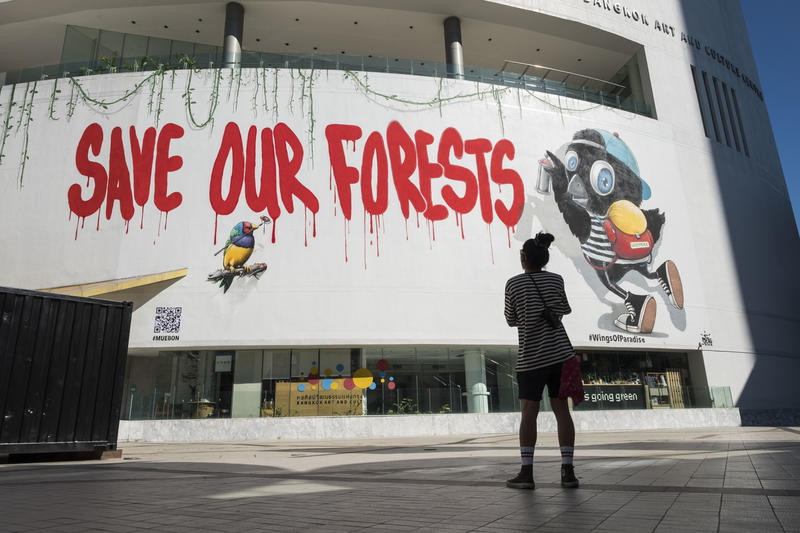
His latest work, the mural Save Our Forests, is part of a world-wide project organized by environmental activism group Greenpeace. The Wings Of Paradise campaign aims to raise global awareness of the destruction of rainforests for palm oil in Indonesia. Street artists from London to Melbourne to Taipei to Kuala Lumpur have all taken part.
“Forests, home to endangered animals and precious treasures from the earth, are being destroyed by the hands of humans. I hope this artwork will be able to reflect the voices of these animals, voices that otherwise may never reach the concrete jungle,” said the artist.
The work includes Muebon’s flightless bird motif, which the artist often uses to deliver serious messages in a fun-loving way. The cute character is accompanied by an Indonesian bird of paradise. “The birds are invading our home in the city in the same way that humans are invading their homes in the forests,” added Muebon.
Why does Muebon care so much about saving Indonesia’s forests? “It’s not simply Indonesian rainforests which are under threat,” he replied. “They are just an example highlighting the problems faced by forests around the world.”
Muebon thinks the issues surrounding the role of the palm oil industry in deforestation in Southeast Asia are not widely understood by the Thai public. And believes that more people should take note of the situation because of the role forests play in absorbing carbon dioxide and cleaning our air. “If you don’t need oxygen, then you are free to ignore these problems,” he concluded.
The mural will be on the side of the BACC, which is undergoing its own battle for funding, through Oct. 14.
FIND IT:
“Save Our Forests” Mural at Bangkok Arts and Cultural Centre (BACC)
939 Rama I Rd.
Through Oct. 14
BTS National Stadium
